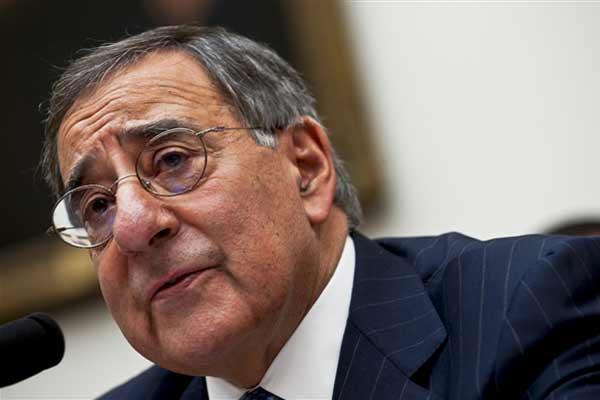Defense Secretary Leon Panetta said Tuesday the military will have fewer generals in a shrinking military whose future readiness is most threatened by political gridlock in Washington.
The Army is drawing down from 570,000 to 490,000 soldiers, and the Marine Corps from 202,000 to 182,000. Reductions in force strength will require flag officers to oversee them as part of what Panetta called "a time of historic change for the U.S. military."
As the size of the force is decreased, "there will also be a reduction in terms of the command structure as well," Panetta said without stating how many should be trimmed from the ranks of more than 950 general and flag officers currently in the military.
"So this should be part of the review process as we try to achieve savings in the force reduction," he said.
Panetta said the jobs of the service secretaries likely would be spared after the idea of cutting those positions had been floated around the Pentagon and on Capitol Hill.
"The reality is that there is an important role for them, because they are civilians. Civilians are involved in providing policy in their areas. They also have to negotiate a lot of the politics of Capitol Hill," Panetta said. "So there is an important role for them to play in terms of their particular service."
When asked if his staff could be in line for similar cuts, his answer was swift.
"Hell yes," Panetta bellowed.
Panetta spoke at a National Press Club luncheon in which he focused on risks to the new national defense strategy approved by President Obama which calls for a smaller military, more emphasis on the Pacific region, a buildup of special operations forces and a de-emphasis of the troop-intensive counter-insurgency (COIN) strategy that was used in Iraq and Afghanistan.
His speech and remarks in a question-and-answer session took on a valedictory tone.
"I look forward to the opportunity to pick walnuts back in the Carmel valley," Panetta said of his long-standing wish to return soon to his farm in California.
President Obama is expected to name his choice to succeed Panetta at the Pentagon, possibly as early as Friday. Former Sen. Chuck Hagel (R-Neb.) has emerged as the frontrunner.
The first risk to Obama's plan came from the stress on the force after 11 years of war, Panetta said, but "the second -- and greatest -- risk facing this new defense strategy" came from "a political system that is depriving this department of the budget certainty we need to plan for the future."
"For more than a year, this Department has been operating under the shadow of sequestration," the process in which more than $1 trillion in budget cuts will be imposed on Jan. 1 unless Congress and the White House can agree on a deficit-reduction deal, Panetta said.
The Pentagon was already implementing $487 billion in cuts over 10 years, Panetta said.
"Because of political gridlock, this department still faces the possibility of a round of mindless, across-the-board cuts totaling another half-a-trillion dollars that will inflict lasting damage on our national defense and hurt the very men and women who protect this country," he said.
Another round of major cuts would impact most on the morale and readiness of the troops to meet future challenges, Panetta said.
"Whenever I visit our troops, they make clear their concern about what those cuts would mean for them and their families," Panetta said. "It is unacceptable to me that men and women putting their lives on the line in distant lands have to worry about whether those here in Washington can effectively support them."
Panetta also said there was an ongoing battle within the Pentagon over the allocation of limited funding. Panetta said he favored spending more on troop readiness rather than big-ticket procurement items.
"There is pressure on the department to retain excess force structure and infrastructure instead of investing in the training and equipment that makes our force agile and flexible and ready," Panetta said.
"Aircraft, ships, tanks, bases, even those that have outlived their usefulness, have a natural political constituency. Readiness does not," Panetta said. "What's more, readiness is too often sacrificed in favor of a larger and less effective force. I am determined to avoid that outcome."
He also spoke about the progress he's seen in Afghanistan after recently returning from his likely final trip to the war zone. However, he gave no hint on the pace of U.S. troop withdrawals in line with Obama's plan to have all combat forces out by the end of 2014.
"Our military commanders and Afghan leaders believe we have fundamentally turned the tide in that effort after years in which we lacked the right strategy and the necessary resources to achieve success," Panetta said.


























